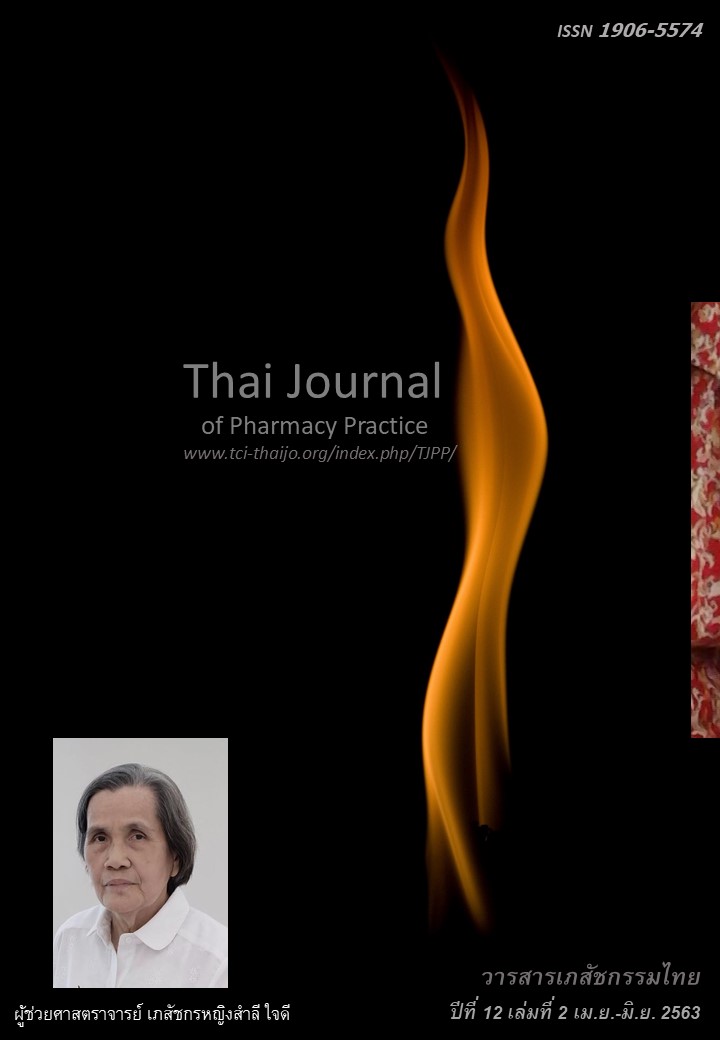คุณลักษณะที่พึงประสงค์และประสิทธิผลทางคลินิกของโมบายแอปพลิเคชันต่อความร่วมมือ ในการรับประทานยาในผู้ป่วยกลุ่มอาการทางเมตาบอลิกที่มีอายุมากกว่า 50 ปี
Main Article Content
บทคัดย่อ
วัตถุประสงค์: เพื่อศึกษาลักษณะที่พึงประสงค์ของโมบายแอปพลิเคชัน (mobile application: app) ที่ส่งเสริมความร่วมมือในการรับประทานยา (medication adherence: MA) และประสิทธิผลทางคลินิกในผู้ป่วยกลุ่มอาการทางเมตาบอลิกที่มีอายุมากกว่า 50 ปี วิธีการ: การศึกษาใช้ระเบียบวิธีวิจัยแบบผสมผสานประกอบด้วยการวิจัยเชิงคุณภาพเพื่อให้ได้คุณลักษณะที่เหมาะสมของ app จากนั้นศึกษาผลของ app ต่อ MA และผลทางคลินิกโดยวิธีวิจัยเชิงปริมาณแบบทดลอง สำหรับการสัมภาษณ์เชิงลึกทำในผู้ให้ข้อมูล 2 กลุ่ม ได้แก่ เภสัชกร จำนวน 15 คนที่มีประสบการณ์ในการให้คำแนะนำการใช้ยาแก่ผู้สูงอายุอย่างน้อย 2 ปี และผู้ป่วยอายุตั้งแต่ 50 ขึ้นไป จำนวน 12 คนที่เป็นโรคกลุ่มอาการทางเมตาบอลิกที่ต้องรับประทานยาเป็นประจำและมี MA ต่ำ การวิจัยเชิงปริมาณทำในผู้ป่วยโรคทางเมตาบอลิกที่มีอายุมากกว่า 50 ปี ขึ้นไป ณ โรงพยาบาลชุมชนแห่งหนึ่ง และมี MA ในระดับต่ำเมื่อทดสอบด้วยแบบวัดความร่วมมือในการใช้ยาสำหรับคนไทย (medication adherence scale for Thai: MAST) การศึกษาสุ่มแยกตัวอย่างออกเป็นกลุ่มทดลองและกลุ่มควบคุม จำนวน 32 และ 35 คน ตามลำดับ กลุ่มทดลองได้รับการติดตั้ง app เพื่อเตือนการใช้ยา สำหรับผลลัพธ์ที่เก็บก่อนและหลังการทดลองทั้ง 2 ครั้งภายในระยะเวลา 5 เดือน ได้แก่ ระดับความดันโลหิต, ระดับพลาสมากลูโคส, MA จากการนับเม็ดยาและ MAST ผลการวิจัย: คุณลักษณะของ app ที่สอดคล้องกับความต้องการของผู้ให้ข้อมูล คือ ความชัดเจนในการมองเห็นและได้ยิน ความสามารถในการแสดงรายละเอียดของข้อมูลยา การมีระบบการเตือนการกินยา รวมถึงระบบการบันทึกและจัดการข้อมูลยา การวิจัยเชิงปริมาณพบว่า กลุ่มทดลองมีระดับความดันโลหิตตัวบนลดลงอย่างมีนัยสำคัญทางสถิติเมื่อเทียบกับกลุ่มควบคุม (P<0.001) สำหรับระดับความดันโลหิตล่างและระดับพลาสมากลูโคสแม้มีค่าลดลง แต่ไม่แตกต่างกันทางสถิติเมื่อเทียบกับกลุ่มควบคุม (P=0.196 และ 0.296 ตามลำดับ) MA จากการนับเม็ดยาและ MAST ของกลุ่มทดลองสูงกว่ากลุ่มควบคุมอย่างมีนัยสำคัญทางสถิติ (P<0.001 และ P<0.001 ตามลำดับ) สรุป: การใช้app ที่มีคุณลักษณะที่พึงประสงค์สามารถเพิ่ม MA และส่งผลดีต่อการรักษาในกลุ่มผู้ป่วยที่มีอายุมากกว่า 50 ปี
Article Details
ผลการวิจัยและความคิดเห็นที่ปรากฏในบทความถือเป็นความคิดเห็นและอยู่ในความรับผิดชอบของผู้นิพนธ์ มิใช่ความเห็นหรือความรับผิดชอบของกองบรรณาธิการ หรือคณะเภสัชศาสตร์ มหาวิทยาลัยสงขลานครินทร์ ทั้งนี้ไม่รวมความผิดพลาดอันเกิดจากการพิมพ์ บทความที่ได้รับการเผยแพร่โดยวารสารเภสัชกรรมไทยถือเป็นสิทธิ์ของวารสารฯ
เอกสารอ้างอิง
2. Thai Health Promotion Foundation. Non-Communicable diseases. [online]. 2014. [cited Apr 16, 2017] Available from: www.thaihealth.or.th/microsite/categories/5/ncds/2/173/176%E0%B8%81%E0%B8%A5%E0%B8%B8%E0%B9%88%E0%B8%A1%E0%B9%82%E0%B8%A3%E0%B8%84+NCDs.html
3. Wang SS. Metabolic syndrome. [online]. 2013. [cited Jul 20, 2017]. Available from: emedicine.medscape. com/article/165124-overview
4. Farrell B, Shamji S, Monahan A, Merkley VF. Reducing polypharmacy in the elderly cases to help you “rock the boat”. Can Pharm J 2013; 146: 243-44.
5. Assantachai P. Problem of using medicine in the elderly 2. [online]. 2014 [cited Apr 15, 2017] Available from: www.si.mahidol.ac.th/project/geriatri cs/knowledge_article/knowledge_healthy_5_002.html .
6. Salzman C. Medication compliance in the elderly. J Clinical Psychiatry 1995; 56: 18-22.
7. Latif S, Mcnicoll L. Medication and non-adherence in the older adult. Med Health R I 2009; 92: 418-9.
8. Sompet N, Ruengorn C, Permsuwan U. The effects of telephone reminder on antihypertensive medica- tion adherence. Songklanagarind Med J 2007; 25:89-97
9. Kriens L. M. Improving medication adherence in the elderly using a medication management system [dissertation]. Netherlands: Tilburg University; 2012.
10. Matlabi H, Parker SG and McKee K. The contri- bution of home-based technology to older people's quality of life in extra care housing. BMC Geriatr 2011; 11: 68. doi: 10.1186/1471-2318-11-68.
11. Ventola CL. Mobile devices and apps for health care professionals: uses and benefits. Pharm Ther 2014; 39: 356-64.
12. Ngamvichaikit A. Mixed methods approach: quali- tative and quantitative research design. Mod Manage J 2015; 13: 1-12
13. Guba EG, Lincoln YS. Competing paradigms in qualitative research. In: Denzin NK, Lincoln YS, editors. Handbook of qualitative research. Thousand Oaks, CA: Sage; 1994. p. 105-17
14. Jongwilaikasem K. Development of a measure for medication adherence scale in Thais. [master thesis]. Songkhla: Prince of Songkla University; 2018.
15. Thai Hypertension Society. Thai guidelines on the treatment of hypertension 2012 Update 2015. [online]. 2015. [cited Apr 15, 2017] Available from: www.thaihypertension.org/files/GL%20HT%202015.pdf
16. Brinkerhoff AJ, Pinto S, Bechtol R. Analysis of metabolic syndrome patients’ self-reported medica- tion adherence barriers affect on pill count. Value Health. 2015; 18: A66.
17. Suphachumroon A. Validity and reliability of the medication adherence scale in Thais among diabetes patients. [master thesis]. Songkhla: Prince of Songkla University; 2018.


